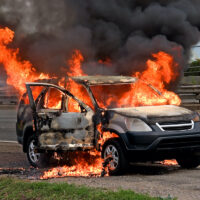Why Do Cars Catch on Fire When They Crash? Defects That Can Cause Fires

One of the most terrifying outcomes of any car accident is a sudden fire. Fires cause painful, debilitating injuries, disfigurement, and disability. When a car crash leads to a fire, there is a much greater risk of serious injury or death. Modern vehicles are supposed to be built to withstand accidents without causing a fire or explosion. When vehicles or their component parts are designed or built defectively, the risk of a fire is much greater. Read on for a discussion of the most common auto defects that can result in vehicle fires. For help after a car fire in Dallas, call a zealous Texas car accident attorney at the Turley Law Firm for assistance.
Faulty Fuel Tanks and Fuel Lines
Fuel tanks and fuel lines within the vehicle carry flammable, dangerous fluids. Gas and oil are meant to remain in safe channels while stored or being utilized by the vehicle. These fluids may leak due to impact, wear and tear, or defective design. When these fluids leak in an accident, they carry a serious risk of fire or explosion.
Vehicle fires are commonly caused by defective fuel tanks that allow fuel to leak out. The fuel lines, fuel tanks, or fuel pressure regulators may be defectively built or defectively designed so they carry a greater risk of rupture during a crash, or there may be a pre-existing leak that ignites from a spark during impact. The location of the fuel tank and the design of the fuel line system are just as important as sturdy construction and the use of proper materials.
Electrical System Failure
Car fires often result from defects in the electrical systems. Modern vehicles have extensive wiring that powers all manner of devices within the vehicle. When that wiring is severed or frayed in an accident, the wires can send off sparks which can then ignite fuel. Modern cars should be designed and built to protect the electrical systems, even in the event of an accident.
Electrical fires can be caused by many different defects within the vehicle. Faulty batteries, worn or otherwise damaged electrical wires, poorly arranged or insufficiently protected electrical wires, and other faulty wiring can lead to a catastrophic fire. Incorrectly installed batteries, starters, or electronics carry similar risks. Whether caused by short circuits, improper installation, or damaged wires, sparks can ignite a number of flammable chemicals within the vehicle. For example, Hyundai recently issued a recall because the anti-lock brake system installed in several models was affected by “foreign contaminants,” which could cause control modules to short circuit and result in an engine fire.
Overheating and Engine Failure
Overheating can result in a vehicle fire during a crash or even without a collision. Overheating can occur when the engine fails due to poor design or as a result of a poorly designed or improperly-installed exhaust system. Mechanical parts in the vehicle that are subjected to excess stress or friction can overheat as well.
Overheating can lead to a fire when the parts connect with the right material. If a collision exposes an overheated electrical part to a flammable liquid, such as oil or gas, a fire can result. Proper vehicle design regulates the heat of all component parts and prevents exposure of overheated parts to flammable materials even in the event of an accident.
If you or a family member has been injured in a Texas car accident, please contact the Turley Law Firm online or call 214-691-4025 or email turley@wturley.com today to schedule your free consultation. Our skilled Dallas attorneys serve clients throughout Texas and multiple Southern and Southwestern states. The Turley Law Firm has handled post-crash vehicle fires for over 50 years in both cars and trucks and is prepared to hold all liable parties responsible for their negligence.
